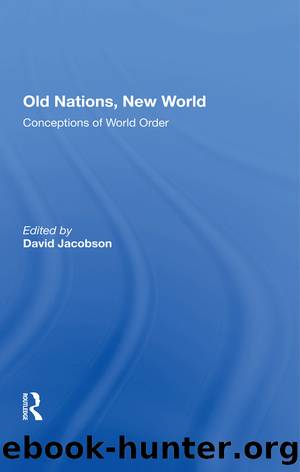Old Nations, New World: Conceptions of World Order by David Jacobson

Author:David Jacobson [Jacobson, David]
Language: eng
Format: epub
ISBN: 9780367297268
Google: bne-zQEACAAJ
Goodreads: 54996584
Publisher: Routledge
Published: 2020-11-09T00:00:00+00:00
What Shaped Contemporary European Reality?
On the face of it, Western Europe is free of signs of the Cold War era. A visitor notices the absence of American NATO convoys on the German Autobahnen, and is struck by U.S. military gear parked idly in German bases. In the press, German newspapers discuss the violent struggles in former Yugoslavia and in other Eastern European countries, explaining to the reader that the peoples there have not âleft behindâ (uberwunden) their nationalistic and ethnic differences as have the western Europeans.
Written in the spirit of Fukuyamaâs âThe End of History,â11 such German press opinions reflect a complete confidence in western Europeâs shedding of its nationalist past. Yet Germany played a key role in Yugoslav affairs by being the first major European power to extend recognition to Croatia and Slovenia. This prompted other governments to follow suit and may have contributed to the sharp Serb reaction. Officials in Bonn deny any political-cultural motive (related to the Catholic and Hapsburg connections of both nations, and possibly to the German creation of a semi-independent Croatia during WWII) but historical answers must be found for that act.12 Indeed, historical reasons may explain German refusal to intervene directly in Yugoslavia.
No common European action has proved possible as yet to effectively stop the slaughter in that country. The reasons for this may be sought in history itself, which shapes European reality more than Fukuyama was willing to understand. True, the issue has to do with instruments that were forged to deal with recent history, i.e., the post-WWII Soviet challenge, which has suddenly disappeared. It has to do with the transition period until new instruments will be found, according to the provisions of Maastricht. But European reality was shaped as well by history and cuiture, by economic factors and by security issues, as manifested in politics and pursued by elites and specific politicians. Those factors gave rise to the European nation state, a European invention that proved itself an important source of identity and orientation for modern man since the French and industrial revolutions. The nation state has also proved since then its limitations and dangers, inherent in its ability to transform the enormous forces that create identities in modern times into political drives and acts, coupled with national economic interests. Similar factors, with novel and sometimes contradictory aspects, determine contemporary European reality.
Here the common institutions created by the Western Europeans, with American backing, ever since the establishment of the European Economic Community (EEC) should be emphasized. Next in importance is the role of modern technology and of the media, in what Zbigniew Brzezinski has defined as the âtechnecronic age.â13 Other factors are changes in the structure of families, in the educational system, and in the traditional political institutions of nations such as Germany and France.
In Germany, the immediate postwar period, and possibly the war itself, spurred the industrial development of the western two-thirds of the nation, a field in which the Germans excelled for a number of reasons. They started from nothing, and thus were bound to no previously existing interests, modes of production and contracts.
Download
This site does not store any files on its server. We only index and link to content provided by other sites. Please contact the content providers to delete copyright contents if any and email us, we'll remove relevant links or contents immediately.
What's Done in Darkness by Kayla Perrin(25500)
Shot Through the Heart: DI Grace Fisher 2 by Isabelle Grey(18220)
Shot Through the Heart by Mercy Celeste(18160)
The Fifty Shades Trilogy & Grey by E L James(17776)
The 3rd Cycle of the Betrayed Series Collection: Extremely Controversial Historical Thrillers (Betrayed Series Boxed set) by McCray Carolyn(13189)
The Subtle Art of Not Giving a F*ck by Mark Manson(12912)
Scorched Earth by Nick Kyme(11833)
Stepbrother Stories 2 - 21 Taboo Story Collection (Brother Sister Stepbrother Stepsister Taboo Pseudo Incest Family Virgin Creampie Pregnant Forced Pregnancy Breeding) by Roxi Harding(11040)
Drei Generationen auf dem Jakobsweg by Stein Pia(10217)
Suna by Ziefle Pia(10186)
Scythe by Neal Shusterman(9263)
International Relations from the Global South; Worlds of Difference; First Edition by Arlene B. Tickner & Karen Smith(8608)
Successful Proposal Strategies for Small Businesses: Using Knowledge Management ot Win Govenment, Private Sector, and International Contracts 3rd Edition by Robert Frey(8419)
This is Going to Hurt by Adam Kay(7695)
Dirty Filthy Fix: A Fixed Trilogy Novella by Laurelin Paige(6453)
He Loves Me...KNOT by RC Boldt(5805)
How to Make Love to a Negro Without Getting Tired by Dany LaFerrière(5378)
Interdimensional Brothel by F4U(5304)
Thankful For Her by Alexa Riley(5162)
